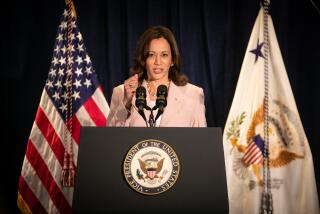DNC Raises $19 Million but Is Still in Debt, Report Says
- Share via
WASHINGTON — Faced with intense investigative scrutiny and mounting legal bills, the Democratic National Committee raised $19 million in the first six months of this year, but it is still $13.4 million in debt, according to a campaign finance report released Thursday.
The Republican National Committee, meanwhile, is generating funds at a faster pace. The RNC disclosed that it has raised $24.6 million this year and has lowered its nearly $10-million debt from the 1996 election campaign to $4 million.
The national parties’ fund-raising reports were submitted to the Federal Election Commission amid inquiries into allegations that both parties tapped improper or illegal overseas sources to help cover their recent record-setting campaign spending. The Senate Governmental Affairs Committee concluded its first round of hearings Thursday on foreign-linked money and other campaign-related abuses.
However, the controversy over fund-raising abuses and the myriad calls for reform do not appear to have dampened the parties’ aggressive appeals to donors. During the first half of 1997, the DNC raised almost $6 million more than it did during the first six months of 1993, the most recent post-presidential election period; the Republican National Committee topped its figure of four years ago by $6.7 million.
The Republicans received a total of $8 million in “soft money”--the term for unregulated contributions to political parties--as of June 30, while the Democrats received $7.2 million in such donations. Republican donors included many prominent corporate interests, such as tobacco and telecommunications companies; the Democrats received various large contributions from labor unions.
The number of individual donors was also up: More than 500,000 gave to the RNC, and 265,000 to the DNC.
But despite considerable fund-raising assistance from President Clinton, the DNC still faces a number of debts, including $5.7 million to Debevoise & Plimpton, a Washington law firm retained for assistance in complying with congressional and Justice Department investigations of DNC fund-raising practices.
All told, the DNC has been hit with 12 subpoenas for documents, and it is paying the legal bills for 18 current and former officers and employees who have been sought for interviews or depositions, officials said.
The legal expenses include $3.1 million to Debevoise & Plimpton itself. The firm, in turn, owes $2.6 million to other companies it has retained, including $650,000 for photocopying services and $693,000 to a temporary employment agency.
Since June, the DNC has capped its payments to Debevoise & Plimpton at $200,000 a month.
White House Press Secretary Mike McCurry suggested that the sweeping demands of Republicans controlling the congressional investigations of the DNC may have a purpose beyond seeking information.
“It has occurred to some that maybe that’s part of the purpose of the majority--to incur extraordinary costs at the DNC so that they don’t have money for campaigns,” McCurry said. “Perhaps that’s too cynical,” he added.
McCurry said Clinton would continue to stump for the DNC--despite criticism for both past fund-raising excesses and continued solicitation of large sums--because he is “committed to helping the party to raise money necessary to run an effective campaign in 1998 and 2000.”
The Democrats have other financial drains as well.
On June 30, the party returned the last of nearly $3 million to donors, many Asian-linked, because the funds were illegal, inappropriate or their sources could not be determined. And it has yet to repay another $5 million for polling, direct mail, media consultants and other costs from last November’s election.
The DNC’s handling of one of the largest donors in its 1997 report was instructive.
Noboru Isagawa of San Clemente, who heads a real estate investment company, gave $50,000 to the DNC last October in response to a direct-mail solicitation, said DNC General Counsel Joseph Sandler. But the party held Isagawa’s check for months until it ascertained that he was a U.S. citizen and a legitimate donor, Sandler said.
He described Isagawa’s contribution as “very unusual,” and, he added, “very welcome.”
Researcher Janet Lundblad contributed to this story.
More to Read
Get the L.A. Times Politics newsletter
Deeply reported insights into legislation, politics and policy from Sacramento, Washington and beyond. In your inbox twice per week.
You may occasionally receive promotional content from the Los Angeles Times.










